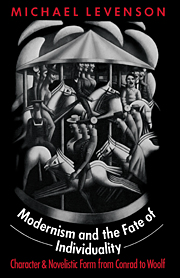Book contents
- Frontmatter
- Contents
- Preface
- Acknowledgements
- 1 Two cultures and an individual: Heart of Darkness and The Ambassadors
- 2 Liberalism and symbolism in Howards End
- 3 Justification, passion, freedom: character in The Good Soldier
- 4 Form's body: Lewis's Tarr
- 5 “The passion of opposition” in Women in Love: none, one, two, few, many
- 6 From the epic To the Lighthouse
- Notes
- Index
3 - Justification, passion, freedom: character in The Good Soldier
Published online by Cambridge University Press: 16 September 2009
- Frontmatter
- Contents
- Preface
- Acknowledgements
- 1 Two cultures and an individual: Heart of Darkness and The Ambassadors
- 2 Liberalism and symbolism in Howards End
- 3 Justification, passion, freedom: character in The Good Soldier
- 4 Form's body: Lewis's Tarr
- 5 “The passion of opposition” in Women in Love: none, one, two, few, many
- 6 From the epic To the Lighthouse
- Notes
- Index
Summary
The Good Soldier repeatedly asks, “What is a character?” and to that question it gives more answers than may be tactful. In so doing, it presents with greater urgency a number of problems that we have been pursuing, and it introduces new issues that will occupy us until the end of the study. Ford was a revolutionary with a bad conscience. He was reluctant to discard those traditions which he professed to scorn, and faced with competing alternatives, he habitually preferred both. This makes him a frustration to the literary theorist but a delight to the literary historian who can uncover in his work the strata of earlier methods beneath the radical experiments for which he is known. Ford's interest, of course, is not simply archaeological. The Good Soldier, a novel so attentive to the problem of historical transition, itself dramatizes a transition in the notion of character. The ambiguities in that notion become resources of plot, and Ford's refusal, or inability, to employ a single consistent method discloses nuances in the concept of individuality which should not only satisfy the historian but may yet provide some consolation for the theorist.
Ford upheld the extreme realist proposition that the success of prose fiction depends on its power to create “an illusion of reality,” and in explaining how that illusion might be achieved, he placed special emphasis on what he called “justification,” by which he meant the granting of perspicuous motives to behavior that might otherwise appear obscure.
- Type
- Chapter
- Information
- Modernism and the Fate of IndividualityCharacter and Novelistic Form from Conrad to Woolf, pp. 102 - 120Publisher: Cambridge University PressPrint publication year: 1991



